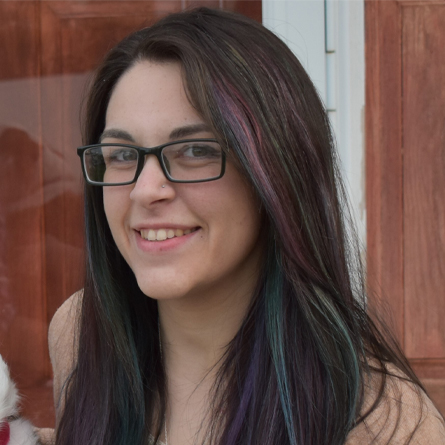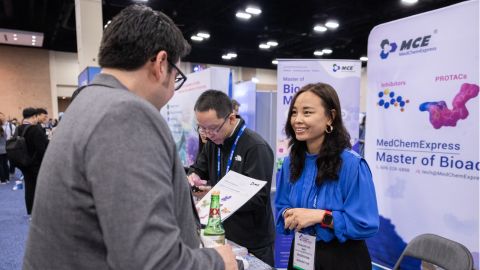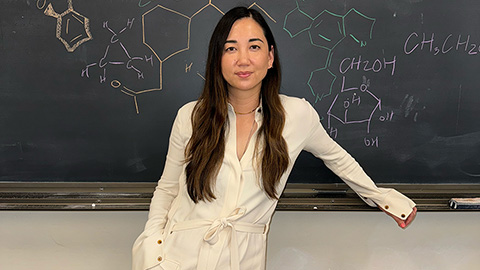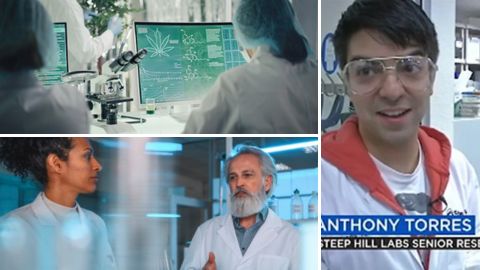‘I could be happy doing other things’
When Alanna Mitsopoulos decided that her aspiration to become a forensic scientist was not practical for financial reasons, it spurred a lot of exploration — and she found that there were many jobs to consider.

Name: Alanna Mitsopolous
Current position: Viral vector senior technician, Addgene
Career path: Bachelor's degree, biochemistry and forensic science
First job outside of academia: Embryologist
Favorite molecule or protein: p30, a prostate-specific antigen used to detect semen at crime scenes
Mitsopoulos told ASBMB Today about her career path and her current role at the nonprofit AddGene, which catalogues and distributes plasmids for research. This interview has been condensed and edited.
Tell me about your scientific training?
I've been interested in science since middle school, when I did a women in science and engineering program. In college I did a biochemistry degree with a forensic science concentration. My senior year, I did an internship with the Boston Police Department crime lab, right at the time of all the scandals with the Massachusetts state labs. (Editor's note: In 2011 and 2013, two state forensic scientists were accused and later convicted of falsifying evidence in criminal cases and stealing confiscated drugs, respectively.) They actually just made a Netflix documentary on it. I'm watching it and thinking, "I remember this conversation happening!"
Wow. So what was your role?
The crime lab was considering switching to a different preliminary test to look for semen for sexual assault cases. They had a lot more to do because the state labs had shut down; with the backlog of evidence, they were trying to reduce false positives and avoid sending something out for secondary analysis that would come back without any DNA. There wasn't a lot of (comparative) research, so I dug really deep to find information on how the tests work so that after I left they could decide whether to switch.
First job after college?
To pursue forensic science, I would have needed to go to grad school, and I didn't have the money to do that right away. In exploring other careers, I realized that I could be happy doing other things; that's when I found embryology. I spent four years in an in vitro fertilization clinic, doing everything from egg retrieval to inseminating, assessing the embryos, and freezing or transferring them.
Now you're at Addgene. What do you do there?
I'm part of the viral vector team; we produce readymade virus aliquots to make it easier for researchers. My average day involves culturing cells — those are always being taken care of — and following my virus prep through till the end: harvesting, purifying and concentrating the virus. Our team takes turns to do quality control checks; we're very proud of the way we handle quality control to confirm that we're sending the customer exactly what we say we are.
Advice for younger scientists?
Internships are the best way to get experience. But when that's not possible — because internships are hard to get, especially now — make yourself stand out in some way. Have your professors review your resume and your cover letter. And always look into the company that you're hoping to be a part of.
Enjoy reading ASBMB Today?
Become a member to receive the print edition four times a year and the digital edition monthly.
Learn moreFeatured jobs
from the ASBMB career center
Get the latest from ASBMB Today
Enter your email address, and we’ll send you a weekly email with recent articles, interviews and more.
Latest in Industry
Industry highlights or most popular articles

Black excellence in biotech: Shaping the future of an industry
This Black History Month, we highlight the impact of DEI initiatives, trailblazing scientists and industry leaders working to create a more inclusive and scientific community. Discover how you can be part of the movement.

Attend ASBMB’s career and education fair
Attending the ASBMB career and education fair is a great way to explore new opportunities, make valuable connections and gain insights into potential career paths.

Benefits of attending a large scientific conference
Researchers have a lot of choices when it comes to conferences and symposia. A large conference like the ASBMB Annual Meeting offers myriad opportunities, such as poster sessions, top research talks, social events, workshops, vendor booths and more.

Biotech startup worms its way into therapeutics
Andrea Choe's company, Holoclara, has created an anti-inflammatory drug based on a molecule from worms.

How military forensic scientists use DNA to solve mysteries
Learn how two analysts at the Armed Forces DNA Identification Laboratory use molecular biology and genetics to identify the remains of fallen troops.

Careers in industry: A year in review
Careers columnist Inayah Entzminger looks back at 12 months of interviews, advice and lists of resources.

